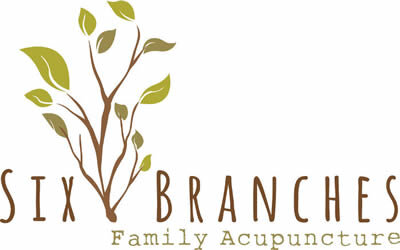OMG, my acupuncturist says I have Liver Qi Stagnation!!??! OK, relax, it's nothing to go running to your MD about. People hear this from acupuncturists all the time. Liver Qi stagnation is really TCM's way of talking about the presence of stress in the body.
Read moreThe Spectrum of Yin and Yang
Everybody wants to ask about Qi, but even more fundamental to acupuncture and TCM theory is the spectrum of Yin and Yang. TCM's idea of balance in the body is based on the concept of Yin and Yang. Acupuncture and Traditional Chinese Medical theory was developed by people who paid very close attention to nature and the world around them. They observed that everything on Earth has both Yin and Yang aspects and they saw the human body as a
You've probably heard of these two words, or at least seen a Tai Ji symbol like this one. Yin and Yang are two ends of a spectrum, not separate entities. Everything Yin contains a little bit of Yang and everything Yang contains a little bit of Yin.They always exist in relation to each other. Let's get a better understanding of these two concepts:
Yin is on one side of the spectrum, representing the substantial, material aspects of the world, while Yang is at the other end, representing the insubstantial, functional aspects of the world.
So for example, cold temperatures, which make matter solid, are Yin, while hot temperatures, which melt solids and evaporate liquids are Yang. In nature, water is a Yin substance, while wind is Yang. Within the reality of water, though, there are some yang manifestations of water (whitewater rapids, ocean waves) and some yin types of water (ice, stagnant marsh water).
Within the body, Yang is the physiological function while Yin is the anatomy and substance of the body. Some examples of Yin substances are blood, organ tissue, body fluids, or waste products, while Yang aspects are Qi, organ function, breath, or body heat. Think of sweating as an example. The actual sweat is a Yin substance, while the body's ability of the pores to open and close is the Yang aspect.
Disruption in the balance of Yin and Yang in the body is the beginning point for poor health and disease. You may develop a certain ache or pain out of the blue. You might just 'not feel right' or feel 'out of sorts'. Western doctors may tell you all your tests are normal, but you know something is off. You might be sleeping more or feeling colder or hotter all the time, or you've seen a change in your appetite or thirst. Imbalances may have been around for a while already by the time you actually notice symptoms of a disease. Determining these imbalances is the first thing an acupuncturist will do when you see them.
Understanding Traditional Chinese Medicine
Chinese medicine is more than acupuncture needles and herbs. It begins with a whole world view. That view is based in a reverence and understanding of nature and how the natural world works.
TCM's early doctors looked at the body as a microcosm of the natural environment. They saw that just as the seasons change, there are seasons of the body. They saw that while the land needs rain, too much rain can bring destruction. They saw that fire, while destructive, helps the ecosystem recycle and rejuvenate. In short, they saw that while nature is always changing, it will always strive for a state of balance.
They also saw that our bodies act like nature. Chinese Medicine's systematic approach to medicine is based on the concept of balance and the idea that the mind/body system has the ability to heal itself if balance is restored.
Traditional Chinese Medicine (TCM) is a complete medical system that has its own understanding of physiology (how the body functions) and its own diagnostic system. It has developed over the course of 3,000 years, based on direct empirical observation by its practitioners. While early TCM doctors long ago did not have sophisticated microscopes with the ability to observe the workings of cells or the presence of bacteria, they still made astute observations about the functional systems of the body and how the body relates to the world around it that continue to be applicable today.
The idea of balance in TCM is a lot like the concept of homeostasis in Western medicine. When your body is too cold, you shiver to warm up, when it is too hot, you sweat to cool down. This is how your body maintains balance. But what happens if there's a blockage that keeps your sweat pores from functioning correctly? You wouldn't be able to sweat and your body wouldn't be able to reach homeostasis on its own. Here's where TCM can step in. By regulating the function of the body, to open sweat pores for example, your body will be able to restore the balance or homeostasis that it is hard-wired to maintain.
Chinese Medicine's use today is not meant to displace Western Medicine, which has brought us many important advances in our understanding and treatment of disease. However, Chinese Medicine can provide a comprehensive approach to pain and common lifestyle diseases in our society, and is often helpful for problems for which Western Medicine has few options. While Western Medicine commonly offers either surgery or pharmaceutical drugs that correct or control local symptoms, Chinese Medicine looks at the body as a whole and corrects imbalances so that the body can actually heal itself over time.
Chinese Medicine is often used today to address chronic pain, functional pain, fertility in both men and women, menstrual irregularities, allergies, digestive problems, sleep issues, anxiety and depression, headaches, chronic fatigue and other auto-immune diseases, and addiction issues, among other conditions. It is also commonly used to address effects of stroke, side effects of chemotherapy, and post-operative pain.
There are a lot of concepts that we talk about in Chinese medicine that may be completely new and foreign to many people. These concepts are often strikingly simply once you understand them, so always ask for more information! The best place to start to understand the TCM mindset is with the concept of yin and yang.
Sleep and Your Body's Rhythms
Ask any med school intern or new parent and they will tell you how much they miss sleep. People often focus on nutrition for better health but, actually, good sleep is just as important as good nutritionin the quest for longevity. The reality is that most people in North American culture are not getting enough. Science has figured out that, among other things, sleep helps us have stronger immune systems, better emotional functioning, and increased learning capacity and memory. We've all heard that 8 hours of sleep is the imperative, but it turns out that when that sleep happens is actually more important than how long it lasts. In Western science, there is a lot of evidence linking late-night shift work with a host of health problems. In 2007, the International Agency for Research on Cancer (IARC) even went so far as to classify night shift work as a probable human carcinogen. TCM theory, also, declares that night time is the right time for sleep!
Similar to the idea of circadian rhythms, in TCM theory, nighttime is yin, while daytime is yang. So it follows that yang activities should be done in the daytime, between 6 AM and 6 PM, and yin activities should be done at night, between 6PM and 6AM. Yang activities include working, exercising, and eating, while yin activities include relaxing, digesting, and sleeping. After 6 PM, it's best to avoid activities that are too stimulating, especially because they may throw off your sleep cycle, and sleep is the most important yin activity of all.
TCM has a lot to say about sleep and sleep difficulties, and insomnia is one of the conditions we see most often. In an ideal TCM world, we'd all be in bed by 10 PM. I know bartenders and rock stars won't like to hear this, but falling asleep by 11 PM will do wonders for your health. Here's why.
Like circadian rhythms, TCM also has an idea about the rhythm of our bodies throughout the day and night. This meridian clock shows the two-hour sections of time that correspond to each Organ System in TCM. An Organ is thought to be at its strongest, and to rule over the function of the body during this time. When someone wakes regularly at the same time each night, we consider that there may be an imbalance with that Organ System.
The Lung, Large Intestine, and Liver/Gall Bladder, are all at their strongest at night. In Western understanding, these organs are main sites of detoxification in the body, so getting enough sleep is essential for cleansing our bodies and bringing them back into balance.
In TCM, the Liver is responsible for moving the body's Qi all day long, so it needs a chance to do its other work, like storing the blood and replenishing yin. When the Liver doesn't have time to rest and nourish the blood and yin, we can start to see menstrual problems, tendon injuries, dry eyes, irritability and anger, and signs of Liver Qi stagnation.
The mental-spirit aspect of the liver, called the Hun (hwen), is our creative spirit and inspiration. If the Hun is well-rooted in Liver blood, it can help us plan our life with wisdom and vision. If Liver blood is weak, our Hun cannot give us a sense of direction in life. Getting enough sleep is essential for our creative endeavors. I know there are many people who find that their most creative time is late at night. This is because of the strength of the Hun at this time, but it can also signal a deficiency of Liver blood because the Hun is not rooted enough to go to sleep. It's actually much better for the Hun to be the most active while you are sleeping.
Besides being the Gallbladder time, 11 PM - 1 AM is an important time for sleep because that is when the Heart is at its weakest. The Heart, another blood-storing and nourishing organ, most needs to rest during that time. When the Heart blood and yin aspects are weak, falling asleep may be difficult because the mind can not settle down, or "take root in the blood" as we call it. The irony is that by staying up late and 'burning the midnight oil', we are literally using up our blood and yin without replenishing them, which will eventually lead to 'burn-out'. It's easy to see how this can turn into a vicious cycle.
Have other questions about TCM's views on sleep? Feel free to leave a comment below. For more information on ways to address insomnia, click here, or talk to your local acupuncturist!
Highlights From The Gluten Summit
Have you been told by your health practitioner that you or your child need to cut gluten out of your diet to address a health concern? Do you want to understand more about why cutting out gluten may help you deal with that health issue? In this post, we answer some common questions that patients ask about gluten sensitivity.
Read moreA Balm for Belly Blues: Maya Abdominal Massage and Gynecological Health
When is the last time you experienced discomfort or dysfunction related to digestion, menstruation, fertility, or injury in the pelvis or lower back? Unfortunately, the answer for many of us is, “Um, yesterday.” We live in a time in which issues with digestive and gynecological function run rampant amongst women of all ages. We also live in a culture in which we are often out of touch, both literally and figuratively, with our bellies. Learn more about Chinese medicine's take on abdominal health and how Arvigo Techniques of Maya Abdominal Therapy can help to address a range of abdominal issues.
Read more








